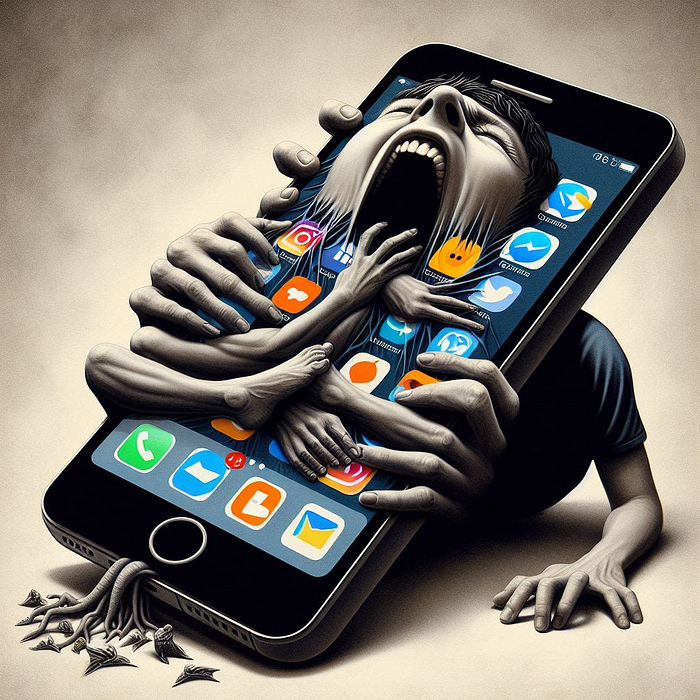The Travesty of Today’s Conversations
Remember when people picked up the phone and called other people?

The pathetic irony of instantaneous, global, multimodal digital connectivity is the death of spontaneity.
Prior to computers, the Internet, and smartphones, people did most of their communication through landline telephones. If you wanted to talk to somebody, you picked up one of these clunky things, dialed their seven digit number, and hoped they were at the location where the phone was plugged into a wall. What we lost in ease we made up for with enthusiasm.
The Pebbles & Bam-Bam technology was crude and inefficient. I remember dreading if the person I was trying to reach had more than three or four digits in their phone number that were higher than “6”, because we had to slide the rotary dial all the way around for each entry. The person also had to be there, near the phone, and not talking to anyone else at the time, or you’d get an annoying busy signal, with no idea when they’d again be free.
Since getting in touch with someone was often a random crapshoot, we’d go for it whenever we could. In retrospect we might assume that the limitations of the tech would have implored us to better prepare for making such a call — but how to arrange time and place? Give them a call? Imagine a world of zero connectivity aside from landline phones and “fax” machines. Back then people had lengthy conversations, mostly in person.
Fast forward to our wired world, one where we have immediate access to everyone we know, every product and service we need, and essentially all data we would ever want through an electronic device that fits into our pockets. Pundits and prognosticators like Arthur C. Clarke saw it coming, yet the manifest reality of the smartphones we now take for granted remains breathtaking. Pollyanna about tech, I consider it net positive.
All technology, like all drugs, come with side effects, and most are familiar with those associated with the digital communications revolution. The overt and measurably deleterious effects of excessive screen time, social media echo chambers, bullying, and abuse, and the threats to democracy itself have been well-documented and debated — making me, for one, wax sentimental about simply picking up a phone and talking to someone.
I cherish my childhood friend Howie, who lives in Chicago and enjoys “FaceTime” bombing me whenever he feels like it.
Working, sitting on the throne, commuting through NYC, my smartphone erupts — before I know what’s happening, a live video stream of bald headed, big eared Howie is hurled into my world. At first I thought: “Who the hell does this?” These days we text each other days in advance to ask when it might be appropriate to call somebody; yesterday I got a Facebook message from a colleague, wondering if I’m free to “catch up” next week.
Contrast that with Howie, who’s unabashedly in my face, a high tech version of our landline telephone behavior when we were kids. Even better, his calls are audiovisual — BOOM! — virtual Howie saying hi, as if he were suddenly in the room or subway train with me. After initial resistance, I realized the awesomeness of his habit, and conversely the insanity and insensitivity of our era’s communications etiquette. We schedule affection.
By contacting a person about contacting them, we automatically relegate them to a task. Without thinking about it, we drain all humanity from the act of connecting with them. Our mindset and emotional needs shift from “I want to talk to X,” to “I am scheduling X into my busy life as if I would a business meeting, ride across town, or Amazon order.” My colleague wants to “catch up,” but how much does he actually care? He can’t call me, say hi?
Such a conundrum is yet another way “ease of use” has become a modern scourge. Yes, we lead busy lives, and texting is convenient. Yes, carving out a half hour is challenging given any circumstance, so reaching out to schedule a window amid all the daily chaos isn’t callous — instead an exceptional gesture of going above and beyond to reconnect. But I call bullshit. Pick up the fucking phone. Call. If busy, I’ll call you right back.
More tech to the rescue! I’ve extolled the use of voice messages to bridge this gap between convenience and indifference. They are more personal and emotional than texting, and convey something exceedingly rare and woefully neglected these days: giving a shit. So if you genuinely care about someone, call them — and if that’s not feasible, leave them a voice message. Texts aren’t conversation — they’re informing you the pizza has arrived.
